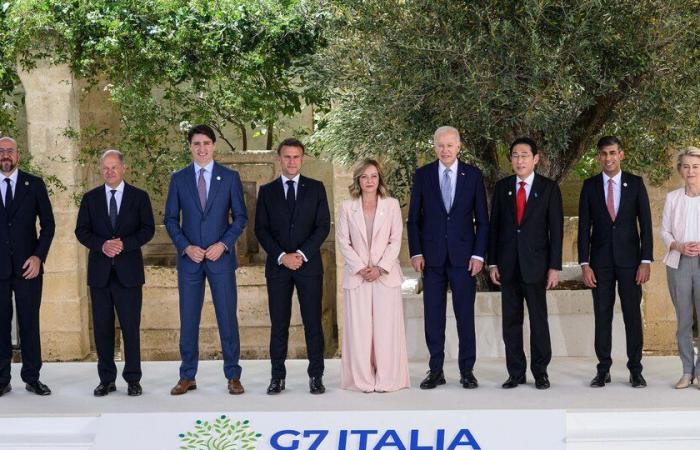
G7 leaders reached a provisional agreement this Thursday to grant a loan to Ukraine of about $50 billion that will be financed with interest generated by Russian assets blocked around the worldmost of which are in the European Union (EU) and, especially, in Belgium.
The final communiqué of the summit, scheduled to be published on Friday after the closing session, will set out the agreement, and will specify that The goal is for the funds to reach Ukraine before the end of the yearaccording to an excerpt from the draft of that text seen by the news agency EFE.
According to that draft, the G7 will simply state in its final communiqué that it collectively commits to providing financing for the kyiv fund, which the G7 countries call Extraordinary Revenue Acceleration Loans (EPA). for Ukraine.
The keys to the agreement
When the war between Russia and Ukraine in February 2022, The United States, the EU and their allies tied up €260 billion of Russian central bank funds around the world, most of which are in financial institutions in Europe and, especially, in the Euroclear securities depository in Belgium. Faced with Ukraine’s growing financial needs, the G7 argues that The reconstruction of the country and the purchase of weapons, among other needs, can be financed with the benefits generated by Russian assets while they are immobilized.
For months, G7 negotiators debated the legality of seizing the money and sending it to Ukraine. The conclusion they reached is that, although the Kremlin cannot access the assets because they are frozen, they still belong to the Russian central bank. However, the profits generated by that money have no owner, so they could be given to Ukraine, something with which Moscow does not agree.
The 260 billion euros of frozen Russian assets They generate about 3,000 million euros per year in profits, but that amount is insufficient to keep kyiv afloat, since it would only cover the financing needs of the Ukrainian Executive for one month. Therefore, the G7 decided to use future interest as collateral for a loan that would provide Ukraine with a substantially larger sum, of at least $50 billion, so that it can rebuild its country and buy more weapons. The United States will be the largest contributoralthough it opened the door for other G7 partners or other countries allied to Ukraine to contribute to the EPA fund.
Another point of contention was who would be ultimately responsible for the loan should the war end without sufficient interest having been generated on Russian assets to repay it. As a US official explained to the press, the G7 leaders committed that Russia’s assets will remain frozen until the Kremlin pays for the damage caused in Ukraine, which according to the World Bank exceeds 450 billion euros.
In this way, there are two options: either Russia pays for the damage caused when the war ends – something that Moscow will hardly agree to – or the assets will remain frozen until they generate enough profits to pay for the loan, according to the aforementioned official. The political reality, however, is more complicated because the 27 members of the EU have to vote unanimously every six months to renew the sanctions that freeze Russian funds and Hungary – Russia’s main ally in the EU – – could vote against, unfreezing the assets.
The Western Celebration
After learning of the agreement, the president of the European Commission, Ursula von der Leyencelebrated. “It is a strong signal that we are sending to Ukraine that we will support them in their fight for freedom as long as necessary.”but also for (Russian President Vladimir) Putin, who cannot prevail over us,” he said at the end of the first day of the summit, in the Italian region of Apulia.
“The message is also that it is not the European taxpayers who are paying for the damage that Putin is causing with his war of aggression, because it will be the extraordinary profits from the frozen assets in Europe that will contribute to this loan,” he clarified.
The German Chancellor Olaf Scholz described the decision of the G7 summit as historic. “This is a clear signal to the Russian president so that he understands that he cannot expect our aid to Ukraine to cease due to fiscal problems,” Scholz said in a statement without questions to the media. “This is a historic day and a historic decision. Now we have to work on its implementation,” he added.
The Russian reaction
For its part, Russia promised an extremely painful response if the EU finally hands over to Ukraine the Russian funds that it keeps blocked in its territory. “The imminent retaliatory measures will be extremely painful for Brussels“warned the Russian Foreign Affairs spokesperson, Maria Zakharova, who described these sanctions as another blow to international law and indicated that this step will not lead the West to anything good. “Illegal initiatives to inject money into the kyiv regime at the expense of others bring imbalance to the financial system,” he stressed.
On the other hand, Zajarova denounced that both the United States and the United Kingdom are inciting Ukraine to commit barbaric terrorist attacks against Russian territory. “They openly incite the kyiv regime to commit barbaric terrorist attacks. Apparently, destruction is not enough for them, they demand more from the kyiv regime. They encourage direct attacks deep inside Russia, and even this is not enough. Now in Washington and London they are beginning to plan sabotage,” he warned.
Zajarova thus mentioned a series of reports that recently appeared in the British press, in which it is stated that Ukraine could carry out attacks on Russian civilian infrastructure if it loses the war. For the spokesperson, these types of actions can only be financed with money from the West.





